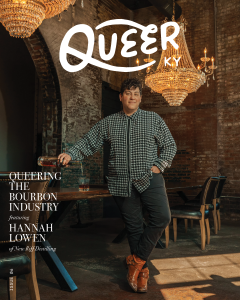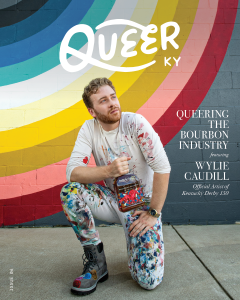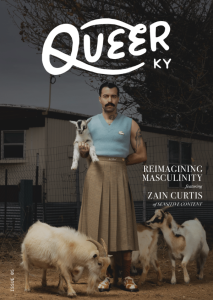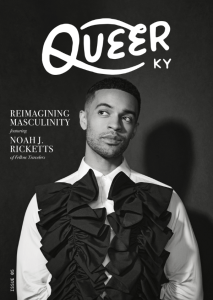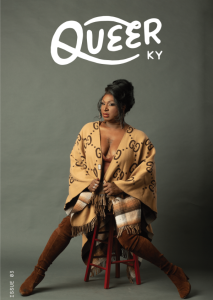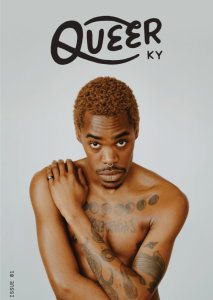As anti-LGBTQ+ political chess uses students as pawns, Kentucky’s youth are the most impacted
This story is part of a series from Queer Kentucky focused on following the 2024 Kentucky General Assembly from a queer lens. Follow Queer Kentucky on your favorite social media platform to stay up-to-date with our GA24 coverage. If you are a Kentuckian who identifies as LGBTQ+ and you would be open to sharing how the anti-LGBTQ+ bills impact you, please reach out to [email protected] for a developing story highlighting the experiences of those most impacted.
Starting as a Facebook post made by then senior Mckenzie Roller (they/them), hundreds of Kentucky youth rallied in Frankfort against SB 150 on March 29, 2023. Despite their pleas and organizing across the state, SB 150 passed and became “one of the worst anti-trans laws in the nation,” according to the ACLU of Kentucky.
SB 150 regulates gender-affirming medical care for Kentucky youth, as well as bathroom usage, curriculum regulation, and pronoun usage regulations for public schools. It took effect in August of 2023 after great uproar from Kentuckians across the state.
This rally had students from across the Commonwealth who were inspired to fight for their and their peers’ rights to be safe and comfortable in schools. Many of the same students continued to fight in their schools to lessen SB 150’s impact, as well as reflecting and urging adults to listen to students. When the Boyle County School District attempted to use SB 150 to quietly ban more than 100 books, a local campaign by a group of students and their peers successfully pushed back, receiving national coverage for doing so. The students were an example that there is the option to push back and organize, regardless of how they might be discounted for their age. The resilience of the students’ and their commitment to sharing their stories has been further documented through the TransKY Storytelling Project, an anonymous account highlighting the bill’s impact on students and teachers.
Through the help of the TransKY Storytelling Project and co-organizers of the rally, some of the impacts of SB 150 on students and teachers are outlined below.
Although co-organizer of the rally, Mckenzie Roller, is no longer in high school, they are still good friends with some students and co-organizers of the rally held in March of last year. Mckenzie shares that they believe their pride group had been disbanded due to not being able to advertise the group due to regulations in SB 150.
To hear it was no longer available greatly saddened Mckenzie because they didn’t feel comfortable telling their parents at first about their queerness, and they had no friends to relate to or talk to about being queer. They share that they are upset for the older students who lost that community, and even more upset for the younger students who will no longer have access to the community that helped Mckenzie find identity, community, and safety to be who they are.
Madison Yates (she/her), a co-organizer with Mckenzie, is currently a senior at Pleasure Ridge Park High School. When asked how she feels about SB 150 and its impacts, she says, “It ticks us off, because nobody actually cares – especially the girls. We feel better when a trans student uses our bathroom more than a men’s restroom, because most attacks against trans teens are instigated by cis males.”
Anna Marasco-Quibera (they/them) runs the TransKY Storytelling Project. They are a student at Paul Laurence Dunbar High School, and they were a part of a school walkout in order to protest SB 150. They spoke of being filled with fear and constant intensity, and despite advocacy and student gatherings, they felt like they and their friends were “screaming into a void.”
Anna is on the Student Voice Team, which helps Kentucky’s young people understand the legislative process and policy decisions made about their schools. Their position on KSTV is to track bills, and they were particularly aware of SB 6 and HB 9 this legislative session. These bills were dubbed anti-DEI by American Civil Liberties Union of KY and the Fairness Campaign, Kentucky’s leading LGBTQ+ advocacy groups.
Anna finds it “insidious” that a lot of people are not able to know what bills are moving until they are made law and then widely spread on the news. They recognize it is hard to keep up with what is happening between work, school, and other involvement. But, they believe “this gives legislators the ability to quietly move anti-trans and anti-DEI bills that are arguably just as harmful as SB 150.”
Lauren Hill (she/her) is a teacher at Leestown Middle School, where she has co-sponsored the Gay Straight Alliance for the last 3 years with little opposition. She notes that just seeing the name of the club sends the message to students that they are seen and loved– whether they join the club or not.
She shares that Leestown “continues to be a warm and open community and Fayette County still advocates for all of its students.” But, she has noticed a significant change in how students feel about themselves.
“When your state’s leaders say who you are and how you wish to live isn’t suitable for our education landscape, how is it supposed to make you feel? How does anyone feel when their identity is deemed “less than” or even vulgar? Our students deserve love and respect, not cruel judgment. Maintaining one’s confidence and self-respect as a young person is hard enough. It is unconscionable that our legislators add to that burden. And my fear of parents or other authorities taking action against me if I advocate for them makes alleviating that fear much more difficult,” Ms. Hill shares.
Audrey Elliott (she/her) is an 8th grader at Leestown Middle School. She notes the fear SB 150 has caused, which she says has contributed to anxiety, depression, and other mental health issues for students. The day the bill passed, Audrey was at drama practice as the stage manager for Suessical. As students became aware that SB 150 passed, they increasingly left the room. Within 20 minutes, “the entire cast and crew of Suessical was bawling their eyes out in the hallway,” according to Audrey. It didn’t matter if the students were LGBTQ+ or not; they knew their friends would be negatively impacted. The director had to end the practice due to how upset students were.
Carly Hoofnagle (she/her) is also an 8th grader at Leestown Middle School. While Carly says she is fortunate to live in a district actively trying to protect the rights of teachers and students, the biggest impact of the bill has been “the fear instilled in us.”
“The threat hangs over top of us held with frayed wires,” says Carly. “We know the worst is coming, we just don’t know when. No one knows what they can and can’t say,” she continues.
For Carly, she has observed, “No one knows what they can and can’t teach. This has led to cultural parts of my education to be cut out or watered down. Without proper education, we are bound to repeat the past and set up our future generations for failure. I have seen it in my peers and staff members– that fear. So far at least, fear is the biggest threat to education and student development.”
Benjie (he/him) is a sophomore at Tates Creek High School. He describes himself as generally apathetic, but says that SB 150 was “truly distressing” for him. Despite having safe parents, Benjie describes SB 150 an “infuriating injustice” that causes him to have to jump through all kinds of hoops at school.
Benjie is additionally afraid because he has “so many transgender friends with parents who don’t support them.” He knows that “the constant communication between school and parents will absolutely get them into horrible trouble.” As well, Benjie says that SB 150 is a “slippery slope of anti-trans laws, and that terrifies me.” He takes “great issue” with the medical regulations involved with SB 150 as well.
Joey Hester (they/them) is a junior at Lafayette High School. Teachers used to ask for their pronouns, but now they have to advocate for themselves and outright tell their pronouns “like it’s a dirty secret.”
As the president of their school’s GSA, Joey shares that they’ve had “so many peers confide about how uncomfortable they are with using preferred names or pronouns in school.” As well, Joey shares that students have been uncomfortable using the bathroom, whether it be the one that aligns with the gender they were assigned at birth or not.
Despite efforts from trusted adults to encourage students to tap into queer joy to combat the “homophobic laws,” Joey shares that, “It is so hard to focus on my education when my pronouns and what bathroom I use are more important.”
Regarding this year’s dubbed anti-DEI bills, Joey names panic in their school’s queer community. But, “this year, when these bills rolled around, we were all too scared and tired to do anything. We didn’t see a point in it after all that fighting got us nowhere last year,” according to Joey.
The common narrative Joey’s heard is that they cannot be scared because they need to be strong, but we can only expect so much of that when so much hope was lost after SB 150.





